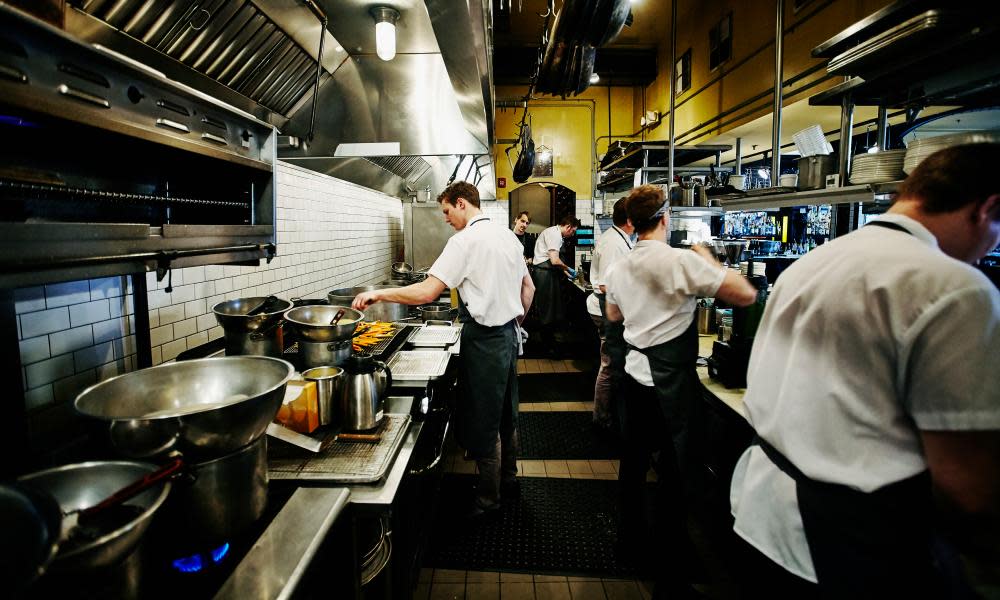Free market promise at an impasse and new battlelines being drawn | Lenore Taylor

It was an unintentionally perfect illustration of the Coalition’s dilemma. In an attempt to horrify its readers with the “reality” of life 100 days after the election of a Shorten Labor government, the Daily Telegraph’s “Future shock” front page ended up listing policies voters overwhelmingly like.
Included on the list of alleged indicators of looming ALP dystopia was the fact that big businesses wouldn’t get a tax cut under Labor, penalty rate cuts for workers would be overturned, the top marginal rate for personal tax would be higher, schools would get more money, we would be more ambitious on renewable energy, banks would be subjected to a royal commission and same-sex marriage would be legalised.
Based on published opinion polls, many Daily Telegraph readers would have just thought “good” when reading down that list of alleged horrors, presuming they could work out what the front page was talking about at all.
Policy should not, of course, be based purely on popular sentiment, but it will always be judged by experience and the context of the times, and right now – here and around the world – the times are rapidly changing because what free markets promised has not played out in people’s lives.
Take penalty rates, where the Tele was warning of the economic consequences of Labor’s pledge to overturn the cuts that began phasing in last weekend.
In a system where wages were adequate or rising and workers were rewarded for increased productivity, there might be room to debate the central social question that informed the Fair Work Commission’s decision - is working on a Sunday still regarded as more socially onerous than working on a Saturday?
But we live in a system where penalty rates are part of the precarious Blu-Tack and sticky tape that hold many household budgets together, where a recent 3.3% increase in the minimum wage will be largely undone by the penalty rate cuts and inflation. A system where wages have stagnated at record low levels, growing at a below-inflation 1.9% annually, meaning that in the real world it feels like a decline, and where productivity has been steadily improving but wages lag behind.
In a world where increased profitability was shared between wages and profits, where executive pay was somewhere within the bounds of reasonable and where companies paid their due taxes, those advocating the penalty rate cuts might find traction for their main economic argument – that businesses might employ more workers on the weekends, or employ existing workers for longer shifts.
But we live in times where there is absolutely no reason to have such faith, where after 26 years of economic growth the share of national income going to Australian households is close to a 50-year low because most of the riches from the commodity boom went straight into the profits of businesses, where executive pay remains stratospheric and where we regularly read of big businesses that arrange their affairs to pay no company taxes at all.
Those who pay attention to policy know that in the first instance the beneficiaries of penalty rate cuts will be small businesses, not the multinationals that have been exposed for shifting profits and avoiding tax, and not even the bigger Australian chains whose workers are on enterprise agreements. But that’s not really the point.
The traditional neoliberal argument that workers will benefit if businesses do well is based on trust in the system and voters’ experience means that trust is pretty much gone. After so many years experiencing the opposite, they just aren’t buying the argument any more, and are highly unlikely to swallow the claim that quantifiable pay cuts now will deliver unspecified extra hours, or extra jobs, sometime in the future.
The penalty rate cuts are so unpopular many businesses are publicising the fact they will not be passing on the allowable reductions in wages and ACTU polling shows the policy could swing votes in marginal seats.
The wages situation is so dire that even the governor of the Reserve Bank, Philip Lowe, is calling it a crisis and urging workers to demand a raise, essentially because of the economic danger that households won’t be able to buy enough stuff. A bunch of (mostly left leaning) economists agree.
Malcolm Turnbull has grasped this reality and is trying to dance around the politics of the penalty rate question – the cut was the decision on the “independent umpire” which we all should remember was set up by Labor.
But Tony Abbott, and apparently the Daily Telegraph, are desperate to revive the old arguments, full throttle. Turnbull, Abbott insists, should be out selling the pro-growth benefits of cutting penalty rates. “Against Labor’s pitch of high wages versus low wages, we need to pitch high wages versus no wages,” he says.
Bill Shorten, meanwhile, can’t believe his good fortune and debate within Labor is now about how hard to push for change – how to strengthen the bargaining power of workers through policy and through a say in public and private institutions to cut back on executive excesses and to make sure that tax is paid.
The old industrial relations battlelines, over WorkChoices, or union misbehaviour, are fading and the new battlelines are much broader questions on the distribution of wealth and power. As in any ideological debate, there’s a distinct advantage for the argument that rings true to the lives of those who need to be persuaded.

 Yahoo News
Yahoo News 
